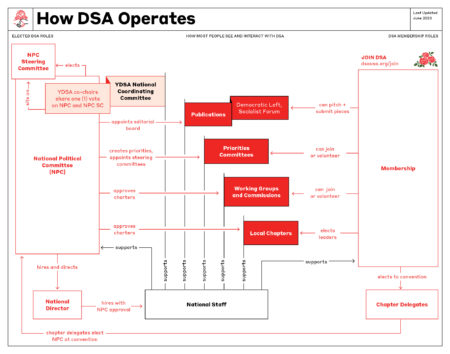
So, back in 2019, I wrote a post on the different DSA caucuses. In that post, I looked only at caucus ideology as caucuses described it.
I thought about doing a similar task before the 2021 DSA Convention. But I decided against it. Why? For one, someone else already did a good job of it. Two, I thought readers might benefit from a fresh approach.
Let’s look at the DSA caucuses by how they react to problems. One specific problem, in fact. So, that’s what I’ll do in this post.
DSA Caucuses and the Socialist vs. Progressive Divide
In the past, I’ve pointed to some of the parallels between the DSA and the old Socialist Party of America. One issue both groups tackled is how to distinguish socialist politics from progressive politics. Among other benefits, laying this out will help us better navigate the transition from social democracy to socialism.
So, here’s a question: how do we distinguish socialists from progressives? How do we tell them apart? Each DSA caucus answers the question in a fresh way. Here’s my attempt at providing the short answer of each caucus.
Bread and Roses: By organizing rank-and-file workers and winning elections.
Socialist Majority: We are progressives, and we must unite with our fellow progressives to win power.
Libertarian Socialist Caucus: By creating non-hierarchical, democratic, participatory structures and movements.
Reform & Revolution: By splitting from the Democratic Party, building a workers’ party, and winning elections.
Class Unity Caucus: By rejecting all forms of identity politics.
Communist Caucus: By organizing workers and tenants to form a class and build power.
A Couple of Notes
I’ll finish by making a few points. First, this is all just one way to distinguish the DSA caucuses from each other. There are others, and I’ll probably return to the topic a few times. We could do the same exercise with another topic or issue, such as differing understandings of the phrase ‘multiracial working class.’
Second, there’s always the difficult task of deciding which of the caucuses to include in an exercise like this one. Some might quibble with my choices. That’s fine by me. For each of the caucuses above, I chose them because they have a fairly national reach, they’ve each been around for a bit, and I’m familiar enough with them to say a few words.
Other groups (such as Emerge) are local. There are also other groups like Marxist Unity and Tempest, which I didn’t quite feel I knew enough to say a lot about. Leaving them off this list doesn’t reflect any negative judgment. In fact, I highly suspect my views are closer to Marxist Unity and Tempest than they are to, for example, Class Unity and Reform & Revolution (possibly also Socialist Majority).
Finally, the caucuses lay out different kinds of socialist politics. Some people charge them with fanning the flames of division within the DSA. And maybe they do a bit about that. But the differences track real issues. Following or not following them involves making politics that look pretty different.